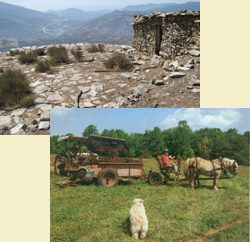Social Futures, Peak Oil, Relocalization
Scenarios of Political Response to Energy Descent Crises
Sunday, December 9th, 2012A number of students of the energy descent have concluded that the new era will include tipping points where key economic and political institutions suddenly go into crisis[1]. Charles Hugh Smith, for example, describes “snapback” points[2] when increasing divergence between “phantom wealth” and real wealth collapses. In The Case for a Disorderly Descent I described [...]
Cities and Suburbs in the Energy Descent: Thinking in Scenarios
Monday, October 8th, 2012This article was originally reviewed, edited and published by Tompkins County Relocalization, a group in upstate New York that is researching various aspects of energy descent.
“A city could be defined, almost, as a human ecosystem that grossly exceeds the carrying capacity of its local environment.” – William Catton
The vulnerability of cities and suburbs in [...]
How Many People Can the World Really Hold?
Monday, October 1st, 2012Spreading awareness that the human population is in overshoot of the carrying capacity of the planet has led to a number of attempts to calculate what the true carrying capacity might be. My objective here is not to provide another calculation, but to explore some issues that need to be faced to address the question [...]
Reductionist Science and the Rise of Capitalism: Implications for a New Educational Program of Agricultural Science
Wednesday, January 4th, 2012The thesis of this essay is that there is a way of doing science that is characteristic of scientific inquiry under capitalism because its methods provide the kind of “irresponsible knowledge” that a profit-at-whatever-cost social system like capitalism requires. As my title implies, I will argue that as capitalism evolved to become an ever more [...]
An Outline of Benefits from a Lower Energy Civilization
Monday, December 12th, 2011The Premises
The universe ultimately runs on an energy economy, not a market economy as the dominant economic ideology claims. Ecological damage is tied to energy use of any kind in our peculiar type of economy where the operating rules of the system require maximization of profits at any cost. Unrestrained profit maximization in turn impels [...]
Implications for Agriculture of Peak Cheap Energy
Sunday, November 27th, 2011By way of introduction to what I have to say, let me explain the evolution of my thinking. As a farmer for 30 years, I have been an active participant in the movement to develop alternatives to Industrial Agriculture. As you may know, much of the motivation for that movement was a growing awareness of [...]
Gleanings for an Understanding of the Endgame
Thursday, October 13th, 2011This essay takes as its premise the energy descent future described in an earlier essay, Invisible Ships and Boiling Frogs: The End of Industrial Affluence. As the endgame of this future deepens and the mass media and government remain stubbornly opposed to enlightening the general public, the internet blogosphere has become an excellent alternative knowledge [...]
The Case for a Disorderly Energy Descent
Friday, May 20th, 2011The energy descent from peak oil production imposes decades of contraction in the global economy. An orderly contraction, particularly in the US, is not likely for a number of reasons. This is a summary of the case for a disorderly descent, garnered from many sources, a couple of which are listed at the end of [...]
What Every Marxist Needs to Know about Ecology
Sunday, December 12th, 2010Karl North 2010
The problem and some options
Nature rules. Everything we do that violates the rules of nature will eventually fail. Nature’s rules include broad ones like the laws of thermodynamics, and more specific ones like those that govern how the soil food web feeds plants.
It follows from the laws of thermodynamics that there are limits [...]
On Invasives
Thursday, November 18th, 2010What I will say here about the issue of invasives may seem picky, but it is not, because it points up a fundamental flaw in how we think about any intervention into the complex, systemic world in which we live.
The flaw running through the whole discourse about invasives is the tendency to see them too [...]
